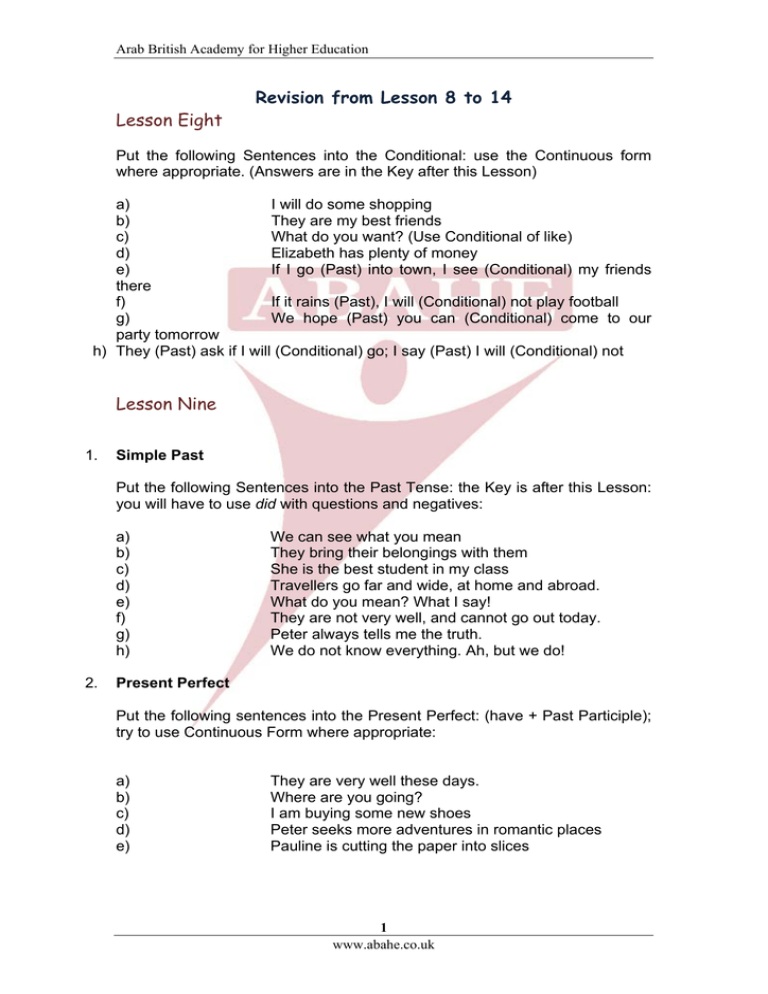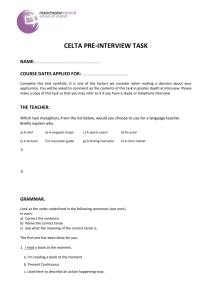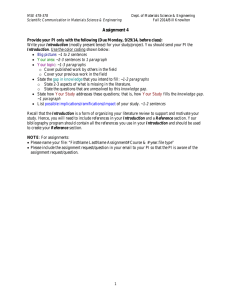
Arab British Academy for Higher Education
Revision from Lesson 8 to 14
Lesson Eight
Put the following Sentences into the Conditional: use the Continuous form
where appropriate. (Answers are in the Key after this Lesson)
a)
I will do some shopping
b)
They are my best friends
c)
What do you want? (Use Conditional of like)
d)
Elizabeth has plenty of money
e)
If I go (Past) into town, I see (Conditional) my friends
there
f)
If it rains (Past), I will (Conditional) not play football
g)
We hope (Past) you can (Conditional) come to our
party tomorrow
h) They (Past) ask if I will (Conditional) go; I say (Past) I will (Conditional) not
Lesson Nine
1.
Simple Past
Put the following Sentences into the Past Tense: the Key is after this Lesson:
you will have to use did with questions and negatives:
a)
b)
c)
d)
e)
f)
g)
h)
2.
We can see what you mean
They bring their belongings with them
She is the best student in my class
Travellers go far and wide, at home and abroad.
What do you mean? What I say!
They are not very well, and cannot go out today.
Peter always tells me the truth.
We do not know everything. Ah, but we do!
Present Perfect
Put the following sentences into the Present Perfect: (have + Past Participle);
try to use Continuous Form where appropriate:
a)
b)
c)
d)
e)
They are very well these days.
Where are you going?
I am buying some new shoes
Peter seeks more adventures in romantic places
Pauline is cutting the paper into slices
1
www.abahe.co.uk
Arab British Academy for Higher Education
Lesson Ten
Put the following Sentences into three forms of the Imperfect: e.g. the sun
was shining through the window
(Please do not include the single word version)
a)
b)
c)
d)
e)
I go into the town
Pam washes before going down to breakfast
What are you doing?
We have new clothes
The birds are singing loudly this morning
Lesson Eleven
1)
Put the following sentences into the Pluperfect Tense (had + Past Participle)
(Please use Non-continuous Form...)
a)
b)
c)
d)
e)
2)
We see our friends in the town
The buses go every fifteen minutes
Where do you want to see me?
The children are looking for presents.
I do not know him
Reflexive/Reciprocal Verbs
Make the following Verbs Reflexive or Reciprocal
a)
b)
c)
d)
e)
We see ________ very often
I look at _____ in the mirror in the mornings
The students do not see ________ as others see them
You consider ______ one of the family
Mary does not think ______ very hard working
Lesson Twelve
1)
Modal Verbs: can, ought, may, would
Put the correct Modal Verbs in the following sentences: there may be more
than one answer:
a) ______ you please come in?
b)
They ________ do this exercise, because it is
necessary
c)
I ______ go out if the weather improves
2
www.abahe.co.uk
Arab British Academy for Higher Education
d)
e)
2)
______ he swim? I think so.
Mary______ go to the dance, if Paul asks her.
Relative Pronouns: join the following sentences with which, who, that:
a)
b)
c)
d)
e)
the distance.
Tom has just arrived. He has my book
We do not ask for help. It is always available
The apples are ripe. They are in the supermarket
Work is to be done. It is constantly with us.
These mountains are beautiful. They are to be seen in
Lesson Thirteen
1)
Rewrite the following Sentences using the Subjunctive:
a)
The Queen lives long
b)
He asked if I _______ pleased (This is rather old
fashioned)
c)
If we (use win)_______ a fortune, we would go on a
world tour
d) God saves the Queen (With the Subjunctive what is the missing word?)
e)
The Company only asks that we _____ loyal
2)
Turn the following sentences into the Passive:
a)
b)
c)
d)
e)
We speak several languages
Elizabeth closed the door
He has not done his homework
The trains carry many passengers
They put (Past Tense) their bicycles in the shed
Lesson Fourteen
Complete the following sentences with a suitable Verb: use the Present Tense
unless otherwise directed
a)
I do not _______ what he means
b)
This train is not _______ to London
c)
Paul ______ me his pen (Past Tense)
d)
Have you ______ what I can see?
e) In France the national language _______ French. What _____ it ___ in
Austria? Austrian? No, German
f)
We usually ______ what we are told.
All Rights Reserved © Arab British Academy for Higher Education
3
www.abahe.co.uk







